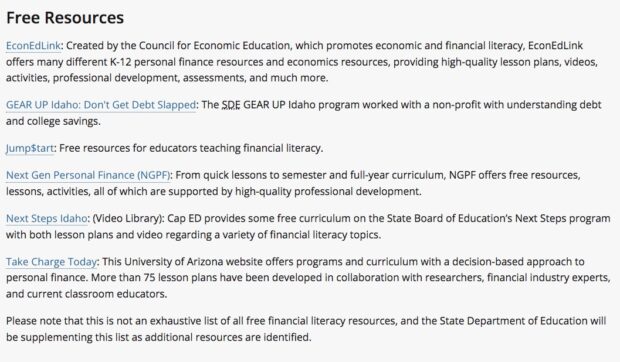Beginning next school year, being financially literate will be one of the core skills that public education will deliver to Idaho students.
To be financially literate, for example, includes understanding the role of personal credit and the differences between good debt and bad debt.
“The reason why we’re excited to talk about that is you have a lot of students who are about to go into the wider world, and they’re making decisions around borrowing,” said Greg Wilson, chief of staff at the State Department of Education.
House Bill 92 passed in the 2023 legislative session and requires high school graduates to have one semester of a personal financial literacy course.
The new requirement begins for the class of 2024. Seniors will now need two credits of government, two credits of U.S. history and one credit of economics and financial literacy.
“But when we were talking to a lot of school districts, they wanted to go above and beyond that requirement,” Wilson said. “Graduation requirements are only a minimum school districts and charter schools can meet.”
Individual schools can request a waiver for students graduating in 2024 who already took their economics course.
Educators with social studies or economics endorsements can teach a combined economics and financial literacy course; and any certified educator can teach a stand-alone financial literacy course.
Superintendent Debbie Critchfield “had consistently heard from our business leaders, our parents, even many of our students, that these kinds of core essential skills for life were important and should be prioritized, and I think for her, financial literacy is a very clear example of that,” Wilson said.
To meet new financial literacy standards, students will study the following topics:
- Recognize the influence of money on human behavior.
- Learn about various types of bank accounts.
- Evaluate various investment options and calculate net worth.
- Learn about types of credit and how credit rating is determined.
- Understand the essentials of financing a college education.
- Evaluate types of personal insurance.
- Recognize how the tax system relates to income.
- Build a budget for independent living.
- Recognize and utilize modern consumer skills, tools, and practices.
“Those are core skills that just extend throughout a lifetime and they should be integrated into what we do in educating our students,” Wilson said. “It should be at the core of what public education is in Idaho.”

The SDE is currently not developing a specific curriculum. Instead, they built a financial literacy website with examples of free curriculum for schools and educators.
“It’s not an exhaustive list yet, but we’re starting to add stuff on,” Wilson said.
“We felt like there was enough free material out there that schools could do this fairly straightforwardly. That’s something we’ll continue to look at and make sure that we’re correct in that assumption,” he said.
